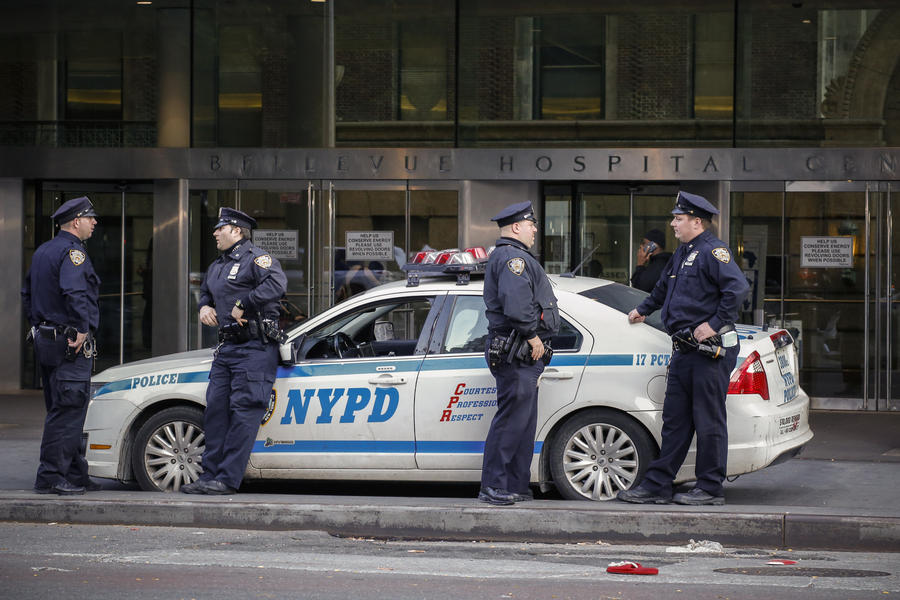Feds forego mandatory quarantines in new Ebola rules, but states get final say


A free daily email with the biggest news stories of the day – and the best features from TheWeek.com
You are now subscribed
Your newsletter sign-up was successful
With states enacting a hodgepodge of rules for people potentially exposed to Ebola, the federal Centers for Disease Control and Prevention stepped in Monday with new guidelines. Unlike New Jersey, New York, and a handful of other states, the CDC recommendations don't include mandatory quarantines for health workers and others returning from Ebola-stricken areas in West Africa.
The CDC can't enforce its guidelines, and states can continue to write their own quarantine rules. But the federal government advises that returning medics and other travelers with no symptoms but deemed "high risk" — they were jabbed with a needle while treating Ebola patients, for example — face travel restrictions and be asked to stay home and avoid public places for 21 days. Most people returning from West Africa will just be directly, actively monitored for 21 days.
"If we do things that make it very difficult for people to come back, if we turn them into pariahs instead of recognizing the heroic work that they're doing," said CDC Director Dr. Thomas Frieden, it will discourage people from helping end the Ebola outbreak in Africa — the only thing that would really make the U.S. safe.
The Week
Escape your echo chamber. Get the facts behind the news, plus analysis from multiple perspectives.

Sign up for The Week's Free Newsletters
From our morning news briefing to a weekly Good News Newsletter, get the best of The Week delivered directly to your inbox.
From our morning news briefing to a weekly Good News Newsletter, get the best of The Week delivered directly to your inbox.
New Jersey Gov. Chris Christie (R) and New York Gov. Andrew Cuomo (D) disagreed with the CDC guidelines and stood by their more stringent quarantine rules — though Christie said on Monday that nurse Kaci Hickox, involuntarily quarantined in a Newark tent after returning from Sierra Leone and a stint treating Ebola patients with Doctors Without Borders, will be allowed to return home to Maine via private transport.
The White House acknowledged Monday that its power in the matter mostly consists of trying to persuade states. Asked why there's not binding federal policy on handling potential Ebola carriers, White House spokesman Josh Earnest referred to the drafters of the Constitution: "I guess you can take that up with James Madison."
A free daily email with the biggest news stories of the day – and the best features from TheWeek.com
Peter has worked as a news and culture writer and editor at The Week since the site's launch in 2008. He covers politics, world affairs, religion and cultural currents. His journalism career began as a copy editor at a financial newswire and has included editorial positions at The New York Times Magazine, Facts on File, and Oregon State University.
-
 The environmental cost of GLP-1s
The environmental cost of GLP-1sThe explainer Producing the drugs is a dirty process
-
 Nuuk becomes ground zero for Greenland’s diplomatic straits
Nuuk becomes ground zero for Greenland’s diplomatic straitsIN THE SPOTLIGHT A flurry of new consular activity in Nuuk shows how important Greenland has become to Europeans’ anxiety about American imperialism
-
 ‘This is something that happens all too often’
‘This is something that happens all too often’Instant Opinion Opinion, comment and editorials of the day
-
 Trump HHS slashes advised child vaccinations
Trump HHS slashes advised child vaccinationsSpeed Read In a widely condemned move, the CDC will now recommend that children get vaccinated against 11 communicable diseases, not 17
-
 FDA OKs generic abortion pill, riling the right
FDA OKs generic abortion pill, riling the rightSpeed Read The drug in question is a generic version of mifepristone, used to carry out two-thirds of US abortions
-
 RFK Jr. vaccine panel advises restricting MMRV shot
RFK Jr. vaccine panel advises restricting MMRV shotSpeed Read The committee voted to restrict access to a childhood vaccine against chickenpox
-
 Texas declares end to measles outbreak
Texas declares end to measles outbreakSpeed Read The vaccine-preventable disease is still spreading in neighboring states, Mexico and Canada
-
 RFK Jr. shuts down mRNA vaccine funding at agency
RFK Jr. shuts down mRNA vaccine funding at agencySpeed Read The decision canceled or modified 22 projects, primarily for work on vaccines and therapeutics for respiratory viruses
-
 Measles cases surge to 33-year high
Measles cases surge to 33-year highSpeed Read The infection was declared eliminated from the US in 2000 but has seen a resurgence amid vaccine hesitancy
-
 Kennedy's vaccine panel signals skepticism, change
Kennedy's vaccine panel signals skepticism, changeSpeed Read RFK Jr.'s new vaccine advisory board intends to make changes to the decades-old US immunization system
-
 Kennedy ousts entire CDC vaccine advisory panel
Kennedy ousts entire CDC vaccine advisory panelspeed read Health Secretary RFK Jr. is a longtime anti-vaccine activist who has criticized the panel of experts
